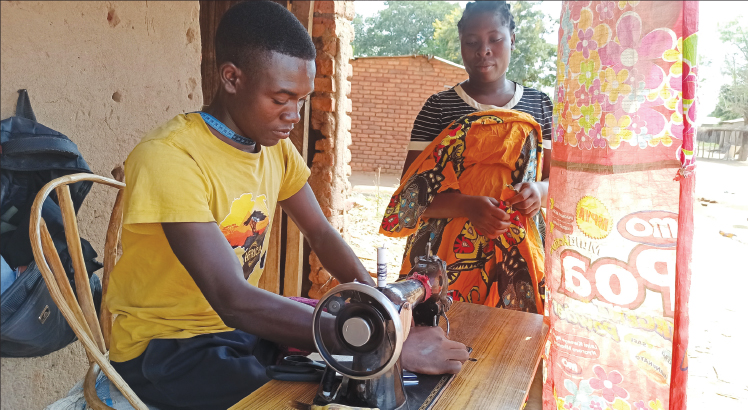Vocational skills’ dividends
For years, the family of Khalidwe Histon, from Maongo Village, Traditional Authority Kalonga in Salima District, survived on piecework.
At times, the 29-year-old man sold charcoal to supplement his hand-to-mouth income.
“I bought a bicycle to boost the charcoal business and later on started a bicycle taxi business widely known as kabaza, which fetched about K5 000 a week,” he explains.
Cycling for a living on the busy, jagged roads of Salima Town put Histon’s life in danger.
He explains: “Salima Boma is always full of activity, but I risked my life just to put food on the table.

“I was involved in two road accidents which nearly took my life. After the second, I quit and returned to the village, where I struggled to readjust from the town lifestyle. But I was only happy to save my life.”
While in the village, he heard of an opportunity for the youth to learn tailoring, bricklaying and carpentry at Kindle Orphan Outreach in the area.
Luckily, he was selected for tailoring. He preferred the trade because there were only two tailors in his area.
“The demand was high and the hands were few. With good skills, I was certain to make it big while meeting my customers’ needs,” Histon says.
After the training at no cost, he makes uniforms for students, choirs and village banking groups, notwithstanding everyday wear for women and children.
“My life is improving. Now I make a profit of K60 000 a month. This translates to almost K15 000 a week, three times what I used to make on the bike that nearly claimed my life,” Histon explains.
The training involved sessions on entrepreneurship and sustainable business management.
The father of two thanks Kindle for giving him a chance to live his dream as his family now owns a house and helps kinsfolk with the proceeds of tailoring.
His neighbour Maron Jabesi, 35, settled for bricklaying after years of slavish piecework in well-off neighbours’ farms.
He narrates: “I had to do the donkey work while neglecting my crop fields. The low-paying jobs reduced me to a beggar.
“My children stopped schooling because I couldn’t afford their fees. They often went to bed and school hungry.”
Nowadays, Jabesi is a happy breadwinner for his family after honing bricklaying skills.
“So far, I have a contract with JCM Power. The independent power producer, which has established a solar farm in Salima, is constructing a warehouse in my community as its corporate social responsibility,” he says.
Jabesi also transmits his skills to the unemployed youths to become financially independent.
Kindle Orphan Outreach executive director Joseph Kandiyesa says the charity has trained over 70 young Malawians in various trades.
The trainings include sessions on how to mobilise resources and become entrepreneurs, not job seekers.
“Over 85 percent of them own businesses,” he says.
Kandiyesa states that the charity is in talks with potential benefactors to expand the vocational skills programmes and ensure trainees get a start-up toolkit.
Technical Entrepreneurial, Vocational Education and Training Authority head of corporate affairs Lewis Msasa says the starter pack motivates the trainees to become entrepreneurs, “but it is a personal choice”.
In 2015, the country rolled out community technical colleges where the youth learn various trades.
“The community colleges were programmed to be demand-driven because what works in one area may not elsewhere. So we need to provide services that will be adopted by those who want to learn,” he says.





